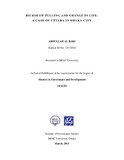| dc.contributor.advisor | Ahmed, Nasiruddin | |
| dc.contributor.author | Al Baki, Abdullah | |
| dc.date.accessioned | 2014-08-31T05:25:32Z | |
| dc.date.available | 2014-08-31T05:25:32Z | |
| dc.date.copyright | 2013 | |
| dc.date.issued | 2013-03 | |
| dc.identifier.other | ID 12172016 | |
| dc.identifier.uri | http://hdl.handle.net/10361/3504 | |
| dc.description | This thesis is submitted in partial fulfillment of the requirements for the degree of Masters of Arts in Governance and Development, 2013. | en_US |
| dc.description | Cataloged from PDF version of thesis. | |
| dc.description | Includes bibliographical references (page 28 - 29). | |
| dc.description.abstract | Informal sector constitutes an important area of the economy of any developing country; it is
the sector for the less skilled or unskilled people, living both in urban and rural areas.
Rickshaws are the means of income or employment generation for the poor people of
Bangladesh. This paper is based on a study drawing on information from the rickshaw pullers
of Uttara in Dhaka city. They are the most vulnerable segment workers among the migrated
rural poor people who leave there village home for a better income. The general objective of
this study is to know about the rickshaw pullers and the change in the rickshaw puller’s life in
Dhaka city.
Both qualitative as well as quantitative methods have been used to carry out the research.
Qualitative data is collected through interviewing rickshaw pullers (50). With the informal
sector employment rickshaw pullers are fighting against poverty and trying to uplift their life.
In this report the change in their livelihood pattern is explored on the basis of fulfillment of
their basic requirements. It also analyzes the factors that influence the overall wellbeing of
their families. The study was based on the perceptions of the respondents about their change
in the life style with the focus on the fulfillment of basic needs.
Three ideas constitute the central message of this study. Firstly, a large number of the
illiterate and unskilled people get employed and generate income by pulling rickshaws which
helps them to live from hand to mouth. Their dependents and family members are also
benefited in this way. Secondly, the findings of the study show that by pulling rickshaw it is
possible to survive in the challenging world but change in life style is very hard. In most
cases, it is possible to bring change in life style if there is income support from other
members of their family like wife’s income or income from village agriculture sector or
others are available. Thirdly, there is positive change in food taking frequency, ability to bear
the cost of the children’s schooling cost but no change was found in their Medicare. In the
transport sector of Bangladesh, if separate lane for rickshaws can be arranged beside all the
main roads of Dhaka city, society will be relieved of traffic congestion and with the use of
solar rechargeable auto rickshaw it can be a large sector for carbon trade for us. The
Government can provide low cost medical facility for the rickshaw pullers. | en_US |
| dc.description.statementofresponsibility | Abdullah Al Baki | |
| dc.format.extent | 49 pages | |
| dc.language.iso | en | en_US |
| dc.publisher | BRAC University | en_US |
| dc.rights | BRAC University thesis reports are protected by copyright. They may be viewed from this source for any purpose, but reproduction or distribution in any format is prohibited without written permission. | |
| dc.subject | Governance and development | en_US |
| dc.subject | Rickshaw pullers | en_US |
| dc.subject | Rickshaw | en_US |
| dc.title | Rickshaw pulling and change in life : a case of Uttara in Dhaka city | en_US |
| dc.type | Thesis | en_US |
| dc.contributor.department | Institute of Governance Studies, BRAC University | |
| dc.description.degree | M. Governance and Development | |

